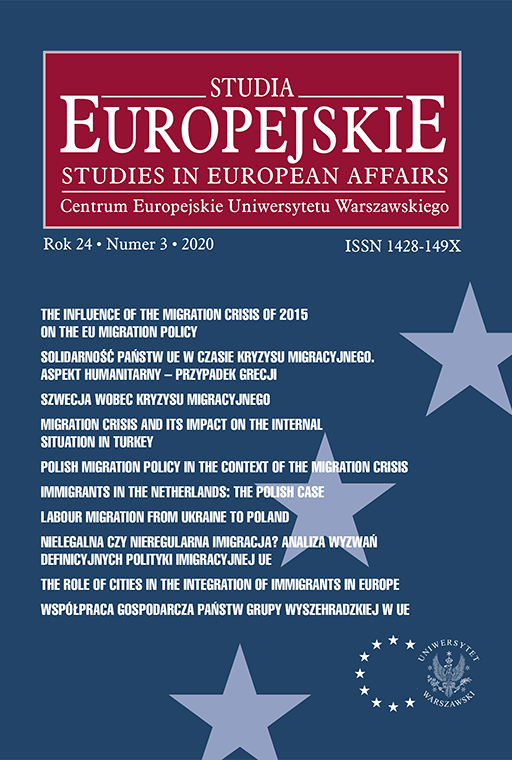
ISSUE: 3/2020
- Volume 24
- Number 3
- 2020
Subscribe NEWSLETTER
Studia Europejskie –
Studies in European Affairs
ISSN: 1428-149X
e-ISSN: 2719-3780
License
Articles published in the journal are under a Creative Commons Attribution – Non Commercial – No Derivatives 4.0 International License
Immigrants in the Netherlands: Second-class Citizens? The Polish Case
Abstract
This article discusses significant problems faced by Polish citizens who live in the Netherlands and who declare their willingness to remain there for the coming years despite the unfair treatment directed towards them. The author elaborates on the history of Polish immigrants in the Netherlands after the Second World War in order to: (1) highlight the Poles’ input into the liberation of the Netherlands during the war and the country’s post-war development; and (2) show mutual, ambivalent PolishDutch relations between the immigrants and the host society. Based on subject literature, Dutch scientific reports, analyses and surveys, the
current situation of Poles is described in the light of unchanging and thus relatively similar problems (despite the passage of time) experienced by Poles living and working in the Netherlands.
References
150 duizend inwoners van poolse herkomst, 13 June 2016, https://www.cbs.nl/nl-nl/nieuws/2016/24/150-duizend-inwoners-van-poolse-herkomst (access 27.04.2020).
20 tot 40 procent migranten ervaart discriminatie bij banenjacht, https://www.nu.nl/economie/3683563/20-40-procent-migranten-ervaart-discriminatiebij-banenjacht.html (access 8.05.2020).
73 rocznica wyzwolenia Bredy przez Dywizję gen. Stanisława Maczka, http://dzieje.pl/artykulyhistoryczne/rocznica-wyzwoleniabredy-przez-1-dywizje-pancerna-gen-maczka (access 12.04.2020).
Article 3(2) of the Treaty on European Union (TEU); Art. 4(2a), art. 20, 26 and 45-48 of the Treaty on the Functioning of the European Union (TFEU).
Balicki J., Amsterdamskie ABC (Amsterdam ABC), Wydawnictwo Iskry, Warszawa 1974.
Bos-Karczewska M., Sytuacja polskiej migracji zarobkowej w Holandii a polityka państwa – nowe wyzwania, Emigration Affairs and Contacts with Poles Abroad Committee at the Senate of the Republic of Poland, Session on 18 March 2014.
Bruquetas-Callejo M., et al., Migration policymaking in Europe: the dynamics of actors and contexts in past and present, The case of the Netherlands, Amsterdam University Press, Amsterdam 2011. “Burgerperspectieven”, no. 4/2013, SCP, December 2013.
Buruma I., Granice tolerancji, “Newsweek” 14 October 2016, http://www.newsweek.pl/europa/granice-tolerancji,44920,1,1.html (access 8.05.2020).
Central Archives of Modern Records (AAN), Ministry of Foreign Affairs, General Representative for Repatriation, Letter No 503 from the Central European Department of the Ministry of Foreign Affairs to the Polish Military Mission in Berlin dated 16 October 1947.
Dalen van H., Waroom waant Nederland zich Europees kampioen discriminatie?, http://www.mejudice.nl/artikelen/detail/waarom-waant-nederlandzich-europees-kampioen-discriminatie (access 18.03.2020).
Directive 2004/38/EC on the right of citizens of the Union and their family members to move and reside freely within the territory of the Member States. Eder W., Diaspora polska w Belgii i Holandii, in: Polska diaspora, eds. K. Kaczmarski, M. Krzysztofiński, Kraków 2003.
Eder W., Polonia w krajach Beneluksu – Holandia, in: Polonia w Europie, ed. B. Szydłowska-Ceglowa, Poznań 1992.
Een op de drie Poolse migranten minstens vijf jaar in Nederland, https://nos.nl/artikel/2230252-een-op-de-drie-poolse-migranten-minstensvijf-jaar-in-nederland.html (access 11.03. 2020).
European Islamophobia Report 2016, SETA, Foundation for Political, Economic and Social Research, Istanbul, Washington, Cairo 2016. https://nos.nl/artikel/2228737-polen-blijven-steeds-vaker-in-nederland. html (access 16.05.2020).
https://www.cbs.nl/nl-nl/nieuws/2016/24/150-duizend-inwoners-van-poolse-herkomst (access 27.04.2020). https://www.cbs.nl/nl-nl/nieuws/2017/05/meer-personen-uit-oost-europaaan-het-werk-in-nederland (access 3.04.2019).
https://www.dutchnews.nl/news/2018/04/polish-community-in-nl-workshard-for-low-pay-and-wants-to-stay/?utm_source=newsletter (access 25.04.2020).
https://www.kis.nl/sites/default/fi les/bestanden/Publicaties/Poolse-arbeidsmigranten-in-Nederland.pdf (access 12.05.2020).
Jaarrapport integratie 2013, SCP 2014, 11 March 2014.
Jansen D., Immigratie en integratie het grootse probleem van Nederland, https://demonitor.kro-ncrv.nl/artikelen/immigratie-en-integratie-het-grootsteprobleem-van-nederland (access 21.06.2019).
Korzewski M., O tolerancji w społeczeństwie i prawie holenderskim, Zakład Wydawniczy “Nomos”, Kraków 2005.
Lijphart A., The politics of accommodation: pluralism and democracy in The Netherlands, University of California Press, Berkeley 1968.
Nadolny A., Polonia Holenderska, “Studia Polonijne”, vol. I/1976.
Pacek M., Migracje, mobilność, wielokulturowość – Holandia wobec problemów migracyjnych, “Studia Europejskie”, no. 4/2016.
Polish community in NL works hard for low pay and wants to stay, 24 April 2018, https://www.dutchnews.nl/news/2018/04/polish-community-in-nlworks-hard-for-low-pay-and-wants-to-stay/?utm_source=newsletter (access 25.04.2020).
Polonia Zagraniczna 1929–1954. Księga Pamiątkowa w 25-lecie istnienia Światowego Związku Polaków z Zagranicy, London 1956.
Radomski J.A., Demobilizacja Polskich Sił Zbrojnych na Zachodzie w latach 1945–1951, Księgarnia Akademicka, Kraków 2009.
Regulation (EC) No 883/2004 on the coordination of social security systems and Regulation (EC) No 987/2009 laying down the procedure for implementing Regulation (EC) No 883/2004.
Regulation (EU) No 492/2011 on freedom of movement for workers within the Union. Ridder de J., Andriessen I., Dekker P., Nederlanders dubbel over discriminatie, “Burgerperspectieven”, no. 2/2017, Sociaal en Cultureel Planbureau, 29 June 2017.
Schmeets H., van Hoof M., Ontwikkelingen in ervaren nationale problemen, 2010–2014, Bevolkings trends, no. 6, CBS, The Hague 2016.
Śledziński K., Czarna Kawaleria. Bojowy szlak pancernych, Wydawnictwo Znak, Kraków 2011.
Tekort aan mijnwerkers. Het Nederlandse element in mijnstreek gaat achteruit, „Limburger Koerier”, 13 August 1929.
Tomkowski Z., Z dziejów Polonii w Europie. Geneza i charakterystyka Polonii, http://ziemia.pttk.pl/Ziemia/Artykul_1974_003. pdf, p. 20 (access 21.01.2020).
Vink M., Dutch multiculturalism: Beyond the pillarisation myth, “Political Studies Review”, no. 5/2007, DOI: https://doi.org/10.1111/j.1478- 9299.2007.00134.x
Walsum van S., Poolse migranten zijn steeds vaker van plan in Nederland te blijven, 24 April 2018, https://www.volkskrant.nl/nieuws-achtergrond/poolse-migranten-zijn-steeds-vaker-van-plan-in-nederland-te-blijven~bc10c806/ (access 22.04.2020).
Wansink H., Zijn Nederlanders toleranter geworden tegenover migranten?, Volkskrant, 13 December 2017, https://www.volkskrant.nl/columns-opinie/zijnnederlanders-toleranter-geworden-tegenover-migranten-~bebf8a3f/ (access 16.12.2019).
Willems W., Verbeek Hanneke, Sto lat tęsknoty. Polacy w Holandii, Wydawnictwo DIG, Warsaw 2014.
Żelichowski R., Stosunki polsko-holenderskie w Europie pojałtańskiej, ISP PAN, Warsaw 2014.
DOI: 10.33067/SE.3.2020.6
Language: English
Pages: 109-128
How to Cite:
Harvard
Gul-Rechlewicz, V. (2020) "Immigrants in the Netherlands: Second-class Citizens? The Polish Case". Studia Europejskie – Studies in European Affairs, 3/2020, pp. 109-128. DOI: 10.33067/SE.3.2020.6